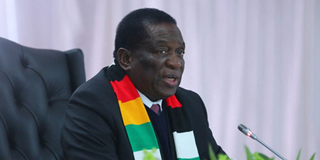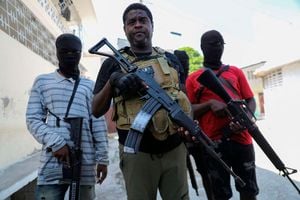Zimbabwe targets more restrictions on political parties

President Emmerson Mnangagwa of Zimbabwe.
What you need to know:
- The long-time lieutenant of Zimbabwe’s former iron-fisted Robert Mugabe, rose to power after a 2017 coup against his mentor.
- Now he is accused of becoming increasingly autocratic because of a sustained crackdown on his critics.
Zimbabwe is mulling legislation that will introduce compulsory registration of political parties amid grapevine that President Emmerson Mnangagwa wants to turn the country into a one party state.
The Zimbabwe Electoral Commission (ZEC), has proposed a law for the registration of political parties to “bring sanity to the country’s politics.”ZEC’s maneuvers followed complaints by Justice minister Ziyambi Ziyambi that “structureless parties” were engaging in endless squabbles and recalls of parliamentarians.
The elections management body has since made proposals to Parliament pushing for the enactment of a law providing for the registration of political parties.Critics say ZEC’s proposals will see the ruling Zanu PF government effectively being a referee and player in the same match since it will determine who can form a political party.
Veritas, a group that monitors law-making in the country, said while registration of political parties was common in other jurisdictions, in Zimbabwe it brought fears that authorities will use it to further close down the democratic space.
“Registration of political parties will bring some certainty to our political landscape, but if registration is made compulsory there is a very real danger it will be used to stifle opposition unless there are strong safeguards to ensure that the registration process is impartial and consistent with a multiparty democracy,” Veritas said.
“If registration is voluntary, on the other hand, the benefits will almost certainly far outweigh any disadvantages.”
The new development add to continual suspicion that the ruling party could go on to amend the constitution.President Mnangagwa (82) is supposed to be serving his last term in office and has recently indicated he won’t stay longer.
But his loyalists are pushing for the scrapping of presidential term limits to help him remain.
The long-time lieutenant of Zimbabwe’s former iron-fisted Robert Mugabe, rose to power after a 2017 coup against his mentor.
Now he is accused of becoming increasingly autocratic because of a sustained crackdown on his critics.
Several opposition leaders and civil society activists have been jailed in recent years for dissent.
Critics accuse him of using lawfare to decimate the opposition with several court judgements being used to virtually shut down the country’s biggest opposition party, the Citizens Coalition for Change (CCC).
After his controversial re-election last year in polls that were condemned by African observers as not meeting regional standards, his government was blamed for the mass recall of elected opposition representatives by an ‘imposter.’
Lloyd Damba, the spokesperson for the opposition Movement for Democratic Change, said ZEC’s intentions were suspicious.
“In other countries within Africa, we have similar laws that require the registration of political parties, in particular Kenya,” Mr Damba said.
“They have their reasons for that and I do not see anything wrong with that particular move.
“It becomes sinister when a body that is not mandated by any law to advocate for the registration of political parties starts doing that when its duties are clearly stipulated in the constitution.“
They want politics to be a game of the rich, in particular those that are looting mineral resources and tenderpreneurs.”On the eve of the August 2023 elections, Zimbabwe’s courts controversially barred exiled former ruling party commissar and minister Saviour Kasukuwere from challenging President Mnangagwa in the polls on the grounds that he had lived out of the country for too long.
The move was cited by the Southern African Development Community (SADC) observer mission as one of the major developments that eroded the credibility of the polls.
ZEC approved 11 candidates, including President Mnangagwa, to run for the presidency but most of them were largely dismissed as proxies of the ruling party who were being used to legitimise the polls.
Nelson Chamisa of the CCC, who was the president’s strongest challenger, was barred from holding rallies ahead of the elections.
Mr Chamisa was forced to abandon his party a few months after the elections citing interference by the ruling and President Mnangagwa’s alleged appetite to control the opposition.
The Zimbabwe Democracy Institute (ZDI), a local think tank, said Zanu PF has always used its incumbency to control the opposition and seek legitimacy.
“The ruling party often provides life support to these opposition parties, strategically keeping them as a smokescreen or titular career opposition parties to retain power,” ZDI said.
“Zanu PF has maintained its dominance through institutional control, political manoeuvring and co-optation of opposition parties.“
By ensuring the cooperation of select opposition parties, incumbents can secure legislative majorities, bolster their credibility and neutralise potential threats to their role.
“This façade of legitimacy helps the ruling elite maintain their grip on power while giving the illusion of a functioning democracy.”
Veritas said the apprehension about the registration of political parties was justified given the polarisation in Zimbabwe.
“If the registration process is not administered by a completely impartial body, it will be perceived as, and may actually be, a barrier designed to inhibit formation of opposition parties and to restrict their activities,” Veritas added.
“In Zimbabwe, a voluntary system of registration would be preferable to a compulsory system in view of Section 67 of the constitution, which guarantees the right to form political parties and also in view of the country’s intensely polarised politics.”
According to ZEC, in 2022 there were over 120 political parties that were participating in the elections management body’s official programmes.
In Zimbabwe political parties tend to sprout around elections and go dormant in between polls.
The southern African country’s next major elections will be held in 2028 when President Mnangagwa’s current term expires and there is already talk of power struggles in Zanu PF around his succession.
One of his deputies, retired General Constantino Chiwenga who led the coup against the late Mr Mugabe, is touted as his most likely successor.





